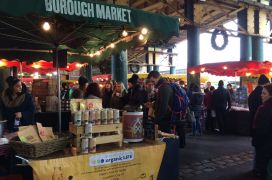Food markets increasingly popular

source: FoodPro Network International
LONDON - Food markets are completely hot again. A recent article in The Grocer this summer shows that in the UK both established markets like Borough Market as well as newer initiatives like Mercato Metropolitano are becoming increasingly successful. Borough Market is one of London's largest and oldest food markets, with more than 5.5 million visitors annually. What makes these covered and indoor food markets so popular? Managing Director of Borough Market, Darren Henaghan, sees that the retail model is changing, and supermarkets can no longer meet all consumer requirements. 'On the other hand, markets offer something different, namely an accessible, personal place where people meet in an attractive atmosphere. They can give attention to the purchase of food products and have direct contact with the suppliers. Reducing the distance from producer to consumer, as well as reducing packaging, both have a positive effect on the sustainability and freshness of the products.’
Markets give an informal way to the neighbourhood, where the shops close their shutters one by one. Moreover, the thresholds to start in a food market are usually low, you need little infrastructure and can still meet a large audience and test your products. ' Often enough entrepreneurs start here, and then relocate somewhere else because they are going to scale up. Throughout the UK, 1,173 markets are found, and everywhere this entrepreneurial spirit can be seen and felt, "says Henaghan. Four food markets recently opened in the UK are Mercato Mayfair, KERB Cambden Market, Harbour Nights in Bristo and Platform in Glasgow.
Of course, also outside the UK we can find known food halls, such as the 'world famous' Mercat de la boquería in Barcelona, Mercado de San Miguel in Madrid, Torvehallerne in Copenhagen and so on. The Netherlands also has beautiful covered food markets. The first real indoor food market is the Foodhallen in Amsterdam, the largest indoor food market is located in Rotterdam, the Markthal with its imposing ceiling. But there are also countless alternatives, such as Fenix Food Factory in Rotterdam, MingleMush in The Hague, FoodDock in Deventer, Down Town Gourmet Market and Vershal het Veem in Eindhoven, or Foodhall Mout in Hilversum. Here, too, you'll find smaller, mostly local players who store their goods for a diverse audience. How much 'on trend', about the commercial success of the market halls, is still some discussion. Entrepreneurs from the Markthal Rotterdam fear for the survival of the concept of a daily open fresh market, now that the hall is becoming emptier and emptier and more often used to consume a 'quick bite'. Additional investments by entrepreneurs on top of the already significant rents have not yet been achieved. In any case, this is not a food market concept with a low 'barrier to entry', also the target group will be a different here than the one in many other, more on the neighbourhood focused food market.
We visited many food markets in the world, as many new initiatives start here. TEN the Export network offers advice and support to food & beverage companies that dare to look across borders. We coordinate export activities, stimulate business development projects and set up new international routes. TEN professionalizes existing export activities and we are consultants working for the SIB programme (Starters International Business Programme of the RVO) for SME companies. For more information: www.theexportnetwork.nl or contact us for an appointment: http://www.theexportnetwork.nl/contact/.
Sources:: The Grocer, July 2019; AGF.nl, September 2019.
Latest news
-
11 jan Nestlé Vietnam invests $100 million in coffee factory to meet growing consumer demand
-
11 jan TraceGains' Together Conference 2024
-
11 dec Alex Holt appointed Chief Sustainability Officer of Ahold Delhaize
-
29 nov Nestlé develops N3 milk with new nutritional benefits, launches first in China
-
21 nov Grocery shopping in Australia
-
20 nov Centuries-old-fermentation technique all hot again
-
12 sep The limits of exports
-
18 aug Detecting and Preventing Coffee Fraud
-
14 aug Connecting the world of food professionals
-
10 aug Sky-high expectations for vertical agriculture
Join the conversation
Are you already a member? Please
Login
Don't have an account yet? Please register